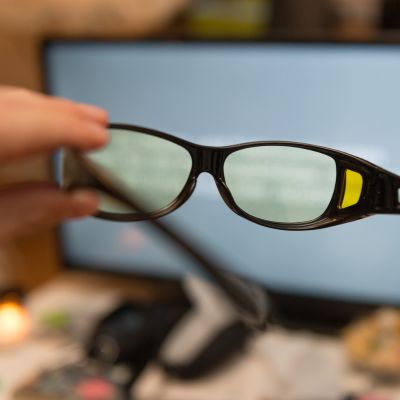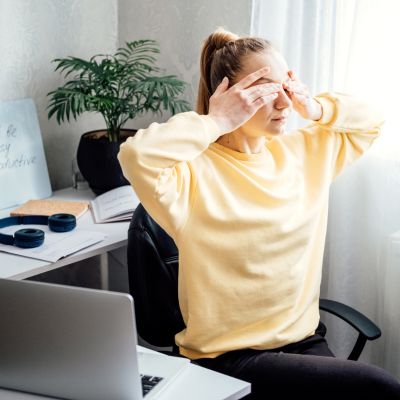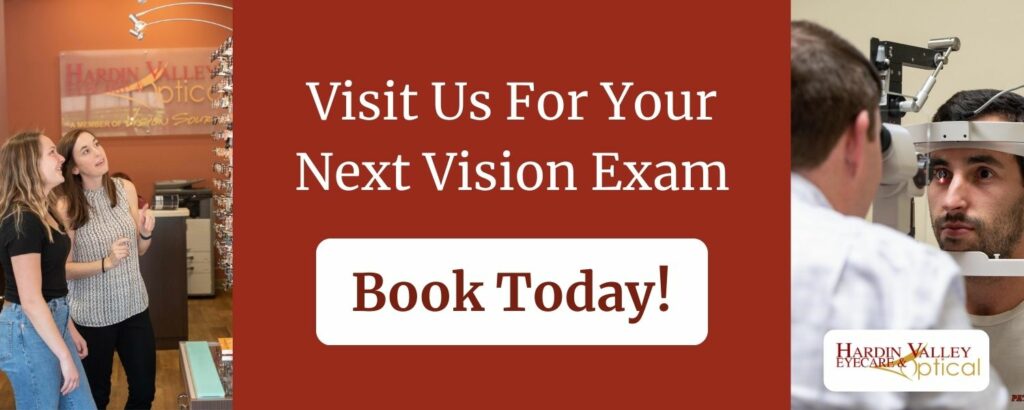Concern about looking at digital screens for too long is growing as more people work and interact on electronic devices for extended periods. One trending potential solution you may have heard of is blue light glasses. They are designed to protect your vision by blocking harmful blue light from your eyes. But that leaves us with a big question: do they actually work?
Research doesn’t show that blue light glasses can prevent all digital eye strain. However, a lot of users claim that they do help. There’s no evidence that it’s harmful to your vision to wear blue light glasses. They may be a good option to try if you work in front of a computer screen the majority of the time.
Do Blue Light Glasses Work?
In short, blue light glasses have some anecdotal evidence of working. Research on blue light blocking lenses has been minimal, and the results have been mixed at best. While there is a lack of conclusive research on the topic, people have reported experiencing improved symptoms when using them. This includes less eye strain and a better night’s sleep.
Glasses that block blue light (computer glasses) are a newer eyewear innovation. But one problem with being new is that they don’t have a lot of evidence to back up their claims. Another issue is that they’re not marketed as medical devices since they’re not regulated by the FDA.
According to the American Optometric Association (AOA), blue light is bad for humans. However, this has more to do with how it affects your sleep than leading to some type of eye condition. Blue light before bed can affect your circadian rhythm. This can make it difficult to get a good night’s sleep by preventing your body’s ability to produce melatonin.
Claims beyond this are a lot more questionable and will require further research. One study claims there’s a correlation between nighttime exposure to blue light and:
- Diabetes
- Heart disease
- Cancer
According to the AOA, much more research and evidence is needed to back up these claims. The effects of man-made blue light are harder to pinpoint since there’s so much variation.
Can I Still Use Blue Light Glasses?
Despite a lack of conclusive research, blue light glasses are growing in popularity. Blue light filter glasses are fairly cheap, with some pairs going for as low as $10 or $15. For that price, many people think that they’re worth giving a try. Prescription blue light glasses, as well as non-prescription reading glasses, are widely available. Most of the time you can simply request a special coating on your prescription glasses to protect your eyes from blue light.
Some users don’t experience much of a difference with blue light-blocking glasses. On the other hand, some people report having fewer:
- Headaches
- Tired eyes
- Sleep problems
Working from home and participating in more virtual than in-person meetings may have increased people’s interest in blue light-filtering lenses. After all, spending all day at home and going from screen to screen can have a huge impact on how your eyes feel. If you find yourself going from screen to screen to screen all day, then they may be worth a try.
According to Dr. Travis Thompson:
Some patients swear by blue light glasses and others do not notice much of a difference. The main problem blue light glasses will help with is if you are having trouble sleeping after looking at screens.
Are Blue Light Glasses Safe?
With all the focus on whether blue light glasses work or not, you may find yourself asking if they’re even safe. People who stare at screens all day, a source of blue light. Whether that’s at work or at home, you may want to use them as your primary glasses. Could exposure to these special lenses end up doing more harm than good if worn for long periods?
They may be controversial among eye health experts for claims about their benefits. Fortunately, there’s no evidence that blue light glasses pose a threat to your vision. This means that you can splurge on a pair and see how your eyes feel after a day of looking at screens.
Digital Eye Strain – The Real Culprit
For most people, tired eyes after a day of looking at screens isn’t due to blue light from digital devices. Instead, it’s the result of digital eye strain. There hasn’t been a lot of research on digital eye strain. Despite the lack of research on digital eye strain, many Americans experience symptoms.
According to The Vision Council, 60% of Americans experience digital eye strain symptoms. There isn’t much research yet, but people’s experience points to a problem that needs to be addressed.
Also known as computer vision syndrome, this vision problem is caused by:
- A lack of sharply defined letters
- Reduced contrast between the letters and the background
- Reflections and glare from the screen
According to Dr. Thompson:
When you are staring at a computer screen, you don’t blink as frequently as you normally do which spreads tears across your eyes. This will cause your eyes to dry out and cause an increased sensitivity to light, frequent tearing and can really blur your vision up more than you would imagine. The best way to combat the dryness is preservative free artificial tears. Avoid frequent use of any redness relieving drops, as they tend to cause your eyes to stay red constantly.
These factors along with others cause our eyes to work harder. Combine that with looking at computer screens all day and you end up with eyes that are achy and dry.
People also report:
- Blurred vision
- Headaches
- Neck and shoulder pain
No wonder people are interested in lenses that filter out blue light. Our eyes’ natural reaction to digital screens leaves them looking for relief!
Additionally, symptoms of eye conditions like dry eye syndrome can be exacerbated by prolonged screen time. When our eyes are continuously focused on screens for extended periods, we tend to blink less frequently, leading to reduced tear production and dry eyes.
How to Prevent Digital Eye Strain
Digital eye strain will continue to be a problem as long as screens are around. Unfortunately, getting rid of screens isn’t an option for many of us. But there are steps you can take to prevent and relieve your symptoms.
Your first step is to schedule a comprehensive eye exam and establish a baseline for your vision. We can check for digital eye strain along with other vision problems such as dry eye.
To help prevent or relieve digital eye strain, try to:
- Blink regularly to lubricate your eyes
- Adjust the brightness and contrast of your digital devices
- Use a filter screen on your devices to reduce glare
- Sit about 25 inches away from your computer screen
- Position yourself where you’re looking down instead of up at your screen
Another great trick is to follow the 20-20-20 rule. This involves looking at something:
- 20 feet away
- Every 20 minutes
- For 20 seconds
Eye strain is a serious issue that affects millions of people who use computer screens for work. Implement these tips to address your strained and tired eyes at their source. You can also consider trying a pair of blue light glasses to see if they work for you.
Do you suspect that you may be suffering from digital eye strain? Contact us today to schedule your comprehensive eye exam!
Blue light glasses are designed to protect your eyes from the blue/violet light from LED lights in digital screens. There’s no conclusive evidence that blue light glasses completely prevent blue light exposure. On the other hand, many users assert that these glasses are beneficial. Wearing blue light glasses is not shown to be harmful to vision. This makes them a viable option if you spend a significant amount of time working in front of a computer screen.
Hardin Valley Eyecare & Optical has been serving Knoxville since 2009. Located at 10904 Spring Bluff Way, you can schedule an appointment online or give us a call at (865) 888-0892.
*This blog was originally published in January 2021, and has since been updated for clarity and new information.






